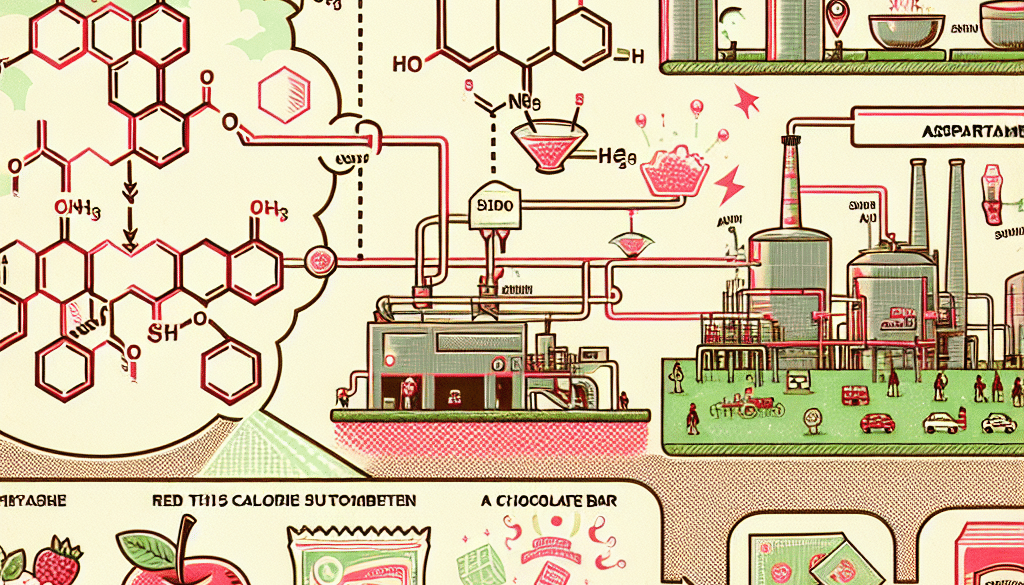Understanding Aspartame: Benefits in Food Processing
-
Table of Contents
- Aspartame: Enhancing Food Processing with Sweet Benefits
- The Role of Aspartame in Food Processing
- Benefits of Aspartame in Various Food Products
- Health Considerations and Regulatory Status
- Case Studies and Statistics: Aspartame’s Impact on Food Processing
- Conclusion: Key Takeaways on Aspartame in Food Processing
- Discover ETprotein’s High-Quality Protein Products
Aspartame: Enhancing Food Processing with Sweet Benefits

Aspartame, a low-calorie sweetener, has been a subject of both acclaim and controversy since its approval for use in food products. This artificial sweetener, discovered in 1965, has become a staple in the food processing industry, offering a sweet taste without the high calorie count of sugar. Understanding the role of aspartame in food processing is crucial for consumers and manufacturers alike, as it impacts health, product development, and dietary choices.
The Role of Aspartame in Food Processing
Aspartame is over 200 times sweeter than sucrose (table sugar), which means it can be used in much smaller amounts to achieve the desired sweetness. This characteristic is particularly beneficial in food processing for several reasons:
- Calorie Reduction: Aspartame’s high sweetness allows for less use, which translates to fewer calories in the final product. This is essential for creating low-calorie and diet foods.
- Taste Profile: Its taste is very similar to that of sugar, which makes it a preferred choice for consumers seeking a sugar-like taste without the calories.
- Stability: Aspartame is stable under heat and within a wide pH range, making it suitable for a variety of food products, including baked goods and beverages.
- Cost-Effectiveness: Due to its high sweetness potency, less aspartame is needed to achieve the desired sweetness, which can result in cost savings for manufacturers.
Benefits of Aspartame in Various Food Products
Aspartame’s versatility makes it an ideal sweetener for a wide range of food products. Here are some examples where aspartame is commonly used:
- Soft Drinks: Diet sodas often use aspartame to provide a sweet taste without the calories associated with high-fructose corn syrup or sugar.
- Desserts and Confections: Low-calorie sweets, chewing gums, and sugar-free candies utilize aspartame to maintain sweetness while reducing sugar content.
- Dairy Products: Yogurts and flavored milks benefit from aspartame’s sweetness, contributing to lower-calorie options in the dairy aisle.
- Tabletop Sweeteners: Aspartame is found in many sugar-free sweetener packets, offering a convenient way for individuals to sweeten beverages and foods without extra calories.
Health Considerations and Regulatory Status
Aspartame’s safety has been extensively studied, and it has been deemed safe for human consumption by over 100 regulatory agencies worldwide, including the U.S. Food and Drug Administration (FDA), the European Food Safety Authority (EFSA), and the World Health Organization (WHO). However, it is not suitable for individuals with phenylketonuria (PKU), a rare genetic disorder, as they cannot metabolize phenylalanine, one of aspartame’s components.
Despite its approval, aspartame has faced scrutiny from the public and some health advocates. Nonetheless, the consensus among scientific communities is that aspartame is safe for the general population when consumed within the acceptable daily intake (ADI) levels.
Case Studies and Statistics: Aspartame’s Impact on Food Processing
Several case studies and statistics highlight aspartame’s benefits in food processing:
- A study on diet soda consumption showed that replacing sugar-sweetened beverages with aspartame-sweetened alternatives can lead to weight loss and improved metabolic health.
- Statistics indicate that aspartame is one of the most commonly used artificial sweeteners in the food industry, with millions of people consuming aspartame-containing products daily.
- Research on consumer preferences has demonstrated that aspartame-sweetened products often rank similarly in taste tests compared to their sugar-containing counterparts, indicating its effectiveness as a sugar substitute.
Conclusion: Key Takeaways on Aspartame in Food Processing
In conclusion, aspartame offers significant benefits in food processing, including calorie reduction, a sugar-like taste profile, stability, and cost-effectiveness. Its widespread use in various food products supports consumer demands for lower-calorie options without compromising taste. While health considerations are important, aspartame remains a safe and valuable sweetener when consumed within recommended limits. The food industry continues to leverage aspartame to meet the evolving needs of health-conscious consumers.
Discover ETprotein’s High-Quality Protein Products
In addition to understanding the role of aspartame in food processing, it’s essential to consider the importance of protein in our diets. ETprotein offers a range of organic bulk vegan proteins that can complement a balanced diet, whether you’re looking to enhance your food products or improve your personal nutrition. Their products, including various plant-based proteins and L-(+)-Ergothioneine, cater to diverse industries and dietary preferences. For those seeking high-quality protein sources, ETprotein is a reliable choice.
About ETprotein:
ETprotein, a reputable protein and L-(+)-Ergothioneine (EGT) Chinese factory manufacturer and supplier, is renowned for producing, stocking, exporting, and delivering the highest quality organic bulk vegan proteins and L-(+)-Ergothioneine. They include Organic rice protein, clear rice protein, pea protein, clear pea protein, watermelon seed protein, pumpkin seed protein, sunflower seed protein, mung bean protein, peanut protein, and L-(+)-Ergothioneine EGT Pharmaceutical grade, L-(+)-Ergothioneine EGT food grade, L-(+)-Ergothioneine EGT cosmetic grade, L-(+)-Ergothioneine EGT reference grade and L-(+)-Ergothioneine EGT standard. Their offerings, characterized by a neutral taste, non-GMO, allergen-free attributes, with L-(+)-Ergothioneine purity over 98%, 99%, cater to a diverse range of industries. They serve nutraceutical, pharmaceutical, cosmeceutical, veterinary, as well as food and beverage finished product distributors, traders, and manufacturers across Europe, USA, Canada, Australia, Thailand, Japan, Korea, Brazil, and Chile, among others.
ETprotein specialization includes exporting and delivering tailor-made protein powder and finished nutritional supplements. Their extensive product range covers sectors like Food and Beverage, Sports Nutrition, Weight Management, Dietary Supplements, Health and Wellness Products, and Infant Formula, ensuring comprehensive solutions to meet all your protein needs.
As a trusted company by leading global food and beverage brands and Fortune 500 companies, ETprotein reinforces China’s reputation in the global arena. For more information or to sample their products, please contact them and email sales(at)ETprotein.com today.












